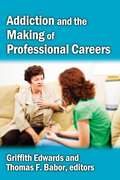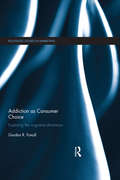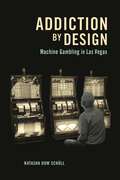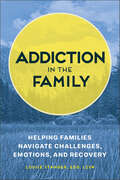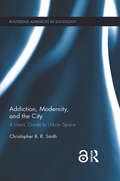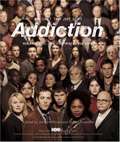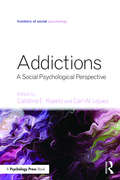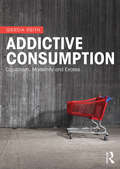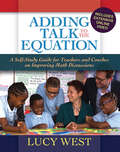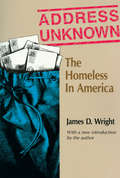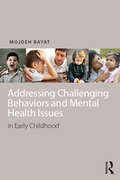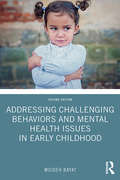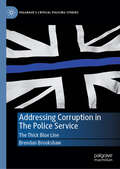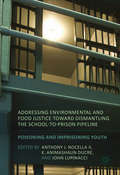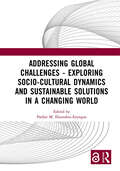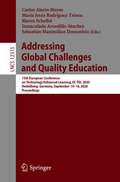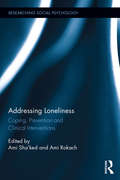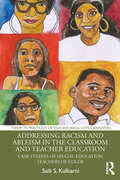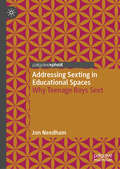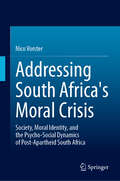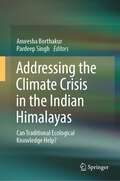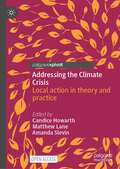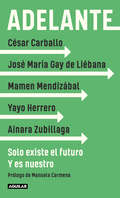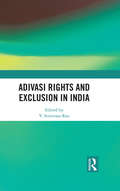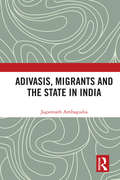- Table View
- List View
Addiction and the Making of Professional Careers
by Griffith EdwardsThe misuse of drugs continues to cause suffering and worldwide economic turmoil. In response to these problems, many have devoted their lives to preventing the misuse of mind-altering substances. Addiction and the Making of Professional Careers focuses on the need for enhanced understanding of professional careers in the addiction field. The spectrum of professionals involved is wide and includes treatment personnel of every kind. Some of the questions examined here include: Why do some people decide to dedicate their lives to responding to drug problems? How do and should we select, train, mentor, support, inspire, and nurture the young career aspirant? What makes for the most effective use of talent? Is every personal case different or can general conclusions be reached? After a foreword by William Miller and an introduction by Griffith Edwards, the book includes interviews with Joseph Brady, Louis Harris, Conan Kornetsky, and Robert DuPont, all of whom were pioneers in the behavioral pharmacological analysis of addiction. Commentary chapters are written by Kerstin Stenius, Ilana Crome, Peter Anderson, and Jonathan Chick.
Addiction as Consumer Choice: Exploring the Cognitive Dimension (Routledge Studies in Marketing)
by Gordon FoxallA striking characteristic of addictive behavior is the pursuit of immediate reward at the risk of longer-term detrimental outcomes. It is typically accompanied by the expression of a strong desire to cease from or at least control consumption that has such consequences, followed by lapse, further resolution, relapse, and so on. Understood in this way, addiction includes substance abuse as well as behavioral compulsions like excessive gambling or even uncontrollable shopping. Behavioral economics and neurophysiology provide well-worn paths to understanding this behavior and this book regards them as central components of this quest. However, the specific question it seeks to answer is, What part does cognition – the desires we pursue and the beliefs we have about how to accomplish them – play in explaining addictive behavior? The answer is sought in a methodology that indicates why and where cognitive explanation is necessary, the form it should take, and the outcomes of employing it to understand addiction. It applies the Behavioral Perspective Model (BPM) of consumer choice, a tried and tested theory of more routine consumption, ranging from everyday product and brand choice, through credit purchasing and environmental despoliation, to the more extreme aspects of consumption represented by compulsion and addiction. The book will advance debate among behavioral scientists, cognitive psychologists, and other professionals about the nature of economic and social behavior.
Addiction by Design: Machine Gambling in Las Vegas
by Natasha Dow SchüllAn anthropologist looks at the new "crack cocaine" of high-tech gamblingRecent decades have seen a dramatic shift away from social forms of gambling played around roulette wheels and card tables to solitary gambling at electronic terminals. Slot machines, revamped by ever more compelling digital and video technology, have unseated traditional casino games as the gambling industry's revenue mainstay. Addiction by Design takes readers into the intriguing world of machine gambling, an increasingly popular and absorbing form of play that blurs the line between human and machine, compulsion and control, risk and reward.Drawing on fifteen years of field research in Las Vegas, anthropologist Natasha Dow Schüll shows how the mechanical rhythm of electronic gambling pulls players into a trancelike state they call the "machine zone," in which daily worries, social demands, and even bodily awareness fade away. Once in the zone, gambling addicts play not to win but simply to keep playing, for as long as possible—even at the cost of physical and economic exhaustion. In continuous machine play, gamblers seek to lose themselves while the gambling industry seeks profit. Schüll describes the strategic calculations behind game algorithms and machine ergonomics, casino architecture and "ambience management," player tracking and cash access systems—all designed to meet the market's desire for maximum "time on device." Her account moves from casino floors into gamblers' everyday lives, from gambling industry conventions and Gamblers Anonymous meetings to regulatory debates over whether addiction to gambling machines stems from the consumer, the product, or the interplay between the two.Addiction by Design is a compelling inquiry into the intensifying traffic between people and machines of chance, offering clues to some of the broader anxieties and predicaments of contemporary life. At stake in Schüll's account of the intensifying traffic between people and machines of chance is a blurring of the line between design and experience, profit and loss, control and compulsion.
Addiction in the Family: Helping Families Navigate the Challenges, Emotions, and Recovery
by Louise StangerA practical and supportive guide for families struggling with addictionGet compassionate guidance that shows you how to navigate the unique challenges faced when a family member is suffering from a substance use disorder (SUD). Addiction in the Family helps you better understand what your loved one is going through while also offering realistic advice for approaching their addiction and how it affects your entire family.Drawing on Dr. Louise Stanger's years of experience as an SUD and family trauma clinician, Addiction in the Family allows you to take things at your own pace and concentrate on the areas where you need the most help. Whether it's finding ways to help your loved one, concentrating on your own self-care, or starting the healing and recovery journey, you'll find practical and thoughtful guidance.Addiction in the Family is:Family-focused—Get advice that addresses the dynamics and challenges of dealing with a partner, child, or other family member who is suffering from SUD.Practical and hopeful—Learn how to set boundaries, deal with strong emotions, and find addiction treatment options, as well as the best ways to communicate with a loved one compassionately and honestly.Filled with real-life examples—Realize that you aren't alone thanks to composite anecdotes—drawn from Dr. Louise's practice—that help you contextualize your experiences.Addiction in the Family will help you discover a measured and considerate way to approach a family member suffering from SUD.
Addiction, Modernity, and the City: A Users’ Guide to Urban Space (Routledge Advances in Sociology)
by Christopher B.R. SmithExamining the interdependent nature of substance, space, and subjectivity, this book constitutes an interdisciplinary analysis of the intoxication indigenous to what has been termed "our narcotic modernity." The first section - Drug/Culture - demonstrates how the body of the addict and the social body of the city are both inscribed by "controlled" substance. Positing addiction as a "pathology (out) of place" that is specific to the (late-)capitalist urban landscape, the second section - Dope/Sick - conducts a critique of the prevailing pathology paradigm of addiction, proposing in its place a theoretical reconceptualization of drug dependence in the terms of "p/re/in-scription." Remapping the successive stages or phases of our narcotic modernity, the third section - Narco/State - delineates three primary eras of narcotic modernity, including the contemporary city of "safe"/"supervised" consumption. Employing an experimental, "intra-textual" format, the fourth section - Brain/Disease - mimics the sense, state or scape of intoxication accompanying each permutation of narcotic modernity in the interchangeable terms of drug, dream and/or disease. Tracing the parallel evolution of "addiction," the (late-)capitalist cityscape, and the pathological project of modernity, the four parts of this book thus together constitute a users' guide to urban space.
Addiction: Why Can't They Just Stop ?
by David Sheff Katherine Ketcham Larkin Warren Katherine Eban Susan Froemke John HoffmanThis companion book to the HBO documentary of the same name sheds light on the hidden American epidemic of addiction and offers a comprehensive and provocative look at the impact of chemical dependency on addicts, their loved ones, society, and the economy.
Addictions: A Social Psychological Perspective (Frontiers of Social Psychology)
by Catalina E. Kopetz Carl W. LejuezThe current volume brings together social psychological theories and concepts and discusses their relevance to understanding substance use and addiction. It identifies convergence points between traditional perspectives on addiction and social psychological theory and research. This coexistence, which acknowledges the value of the conceptual and methodological advancements in each relevant field and attempts to integrate them, promotes scientific understanding and a more effective prevention and treatment of addiction.
Addictive Consumption: Capitalism, Modernity and Excess
by Gerda ReithIn this engaging new book, Gerda Reith explores key theoretical concepts in the sociology of consumption. Drawing on the ideas of Foucault, Marx and Bataille, amongst others, she investigates the ways that understandings of ‘the problems of consumption’ change over time, and asks what these changes can tell us about their wider social and political contexts. Through this, she uses ideas about both consumption and addiction to explore issues around identity and desire, excess and control and reason and disorder. She also assesses how our concept of 'normal' consumption has grown out of efforts to regulate behaviour historically considered as disruptive or deviant, and how in the contemporary world the 'dark side' of consumption has been medicalised in terms of addiction, pathology and irrationality. By drawing on case studies of drugs, food and gambling, the volume demonstrates the ways in which modern practices of consumption are rooted in historical processes and embedded in geopolitical structures of power. It not only asks how modern consumer culture came to be in the form it is today, but also questions what its various manifestations can tell us about wider issues in capitalist modernity. Addictive Consumption offers a compelling new perspective on the origins, development and problems of consumption in modern society. The volume’s interdisciplinary profile will appeal to scholars and students in sociology, psychology, history, philosophy and anthropology.
Adding Talk To The Equation: A Self-Study Guide for Teachers and Coaches on Improving Math Discussions
by Lucy WestFor more than 20 years, Lucy West has been studying mathematical classroom discourse. She believes that teachers need to understand what their students are thinking as they grapple with rich mathematical tasks and that the best way to do so is through talking and listening. In this video-rich edition of Adding Talk to the Equation: Discussions and Discovery in Mathematics, she invites teachers into real-life classrooms where all students stay in the game, stay motivated about learning, and ultimately deepen their understanding. Designed for math teachers and coaches in grades 18, this self-study guide showcases elementary and middle school classrooms where teachers inspire even the most reluctant students to share their ideas. Through the stories of skilled teachers, West offers play-by-play commentary as they get more comfortable with new talk moves and learn to tune in and respond to students' math conversations. Although these discussions occur in math class, the strategies can be used to create a respectful, productive environment for any subject area. This video-based resource examines the importance of creating a safe learning environment; the value of thinking, reasoning, and questioning; the role of active, accountable listening; and the necessity of giving all students a you can do this message. West also emphasizes that slowing down, even in the face of time constraints, is crucial for creating a classroom where all students feel they have something to contribute. This guide includes transcripts of the case studies, with insightful commentary from West that gives you a window into her thinking and the complexities of the work she is doing with teachers, as well as her reflections on missed opportunities.
Address Unknown: The Homeless in America (Social Institutions And Social Change Ser.)
by James WrightDescribes the nature of homelessness, its multiple causes, and its demographic, economic, sociological, and social policy antecedents. Finding the origins of the problem to be social and political rather than economic, Wright (human relations, Tulane) outlines remedies based on existing and modified
Addressing Challenging Behaviors and Mental Health Issues in Early Childhood
by Mojdeh BayatA copublication with the Council for Exceptional Children (CEC), Addressing Challenging Behaviors and Mental Health Issues in Early Childhood focuses on research-based strategies for educators to address challenging behaviors of children during early childhood and elementary school years. Utilizing research from the fields of neuroscience, child development, child psychiatry, counselling and applied behavior analysis, the author suggests simple strategies for teachers to manage behaviors and promote mental health and resilience in children with challenging behaviors. Addressing Challenging Behaviors and Mental Health Issues in Early Childhood provides a framework for best practices which are empirically based and have been successfully utilized in the classroom. An appreciation of the deep understanding of culture as it affects curricular approaches, family engagement, and child growth and development is utilized throughout this comprehensive, multidisciplinary resource. Bayat references the most recent research in the field of child mental health and provides educational and intervention approaches that are appropriate for all children with and without disabilities.
Addressing Challenging Behaviors and Mental Health Issues in Early Childhood
by Mojdeh BayatNow in a fully updated second edition, this essential volume provides research-based strategies to help educators address challenging behaviors in early childhood and elementary years. Drawing on research and approaches from the fields of neuroscience, child development, child psychiatry, counseling, and applied behavior analysis, this text offers teachers simple strategies to manage behaviors and promote mental health and resilience in young children. Thoroughly updated to reflect new developments in neuroscience, trauma, and physical and mental health, this second edition also features an entirely new chapter on classroom approaches in child mental health, including the interaction of technology with challenging behaviors and mental health issues. Comprehensive, multidisciplinary, and culturally responsive, this critical resource provides new and experienced educators and coaches with educational and intervention approaches that are appropriate for all children, with and without disabilities.
Addressing Corruption in The Police Service: The Thick Blue Line (Palgrave's Critical Policing Studies)
by Brendan BrookshawThis book offers an autoethnographic examination of the author's last three years as a serving police officer and as Head of the Professional Standards Department, recorded in personal journals. It analyses the emotional and philosophical impact arising from day-to-day interactions with police officers and reflects on corruption and how it is perceived both inside and outside the service. This book posits a model of the kakistocratic police milieu as a theoretical framework for analysis of the police in contemporary neoliberal liquid modernity which could be used to explore other police phenomenological research data. This autoethnographic insider research provides a rare addition to the knowledge on police corruption. It speaks in particular to those doing professional policing degrees and police practitioners.
Addressing Environmental and Food Justice toward Dismantling the School-to-Prison Pipeline: Poisoning and Imprisoning Youth
by John Lupinacci Anthony J. Nocella K. Animashaun DucreThis cutting-edge collection of essays presents to the reader leading voices within food justice, environmental justice, and school to prison pipeline movements. While many schools, community organizers, professors, politicians, unions, teachers, parents, youth, social workers, and youth advocates are focusing on curriculum, discipline policies, policing practices, incarceration demographics, and diversity of staff, the authors of this book argue that even if all those issues are addressed, healthy food and living environment are fundamental to the emancipation of youth. This book is for anyone who wants to truly understand the school to prison pipeline as well as those interested in peace, social justice, environmentalism, racial justice, youth advocacy, transformative justice, food, veganism, and economic justice.
Addressing Global Challenges - Exploring Socio-Cultural Dynamics and Sustainable Solutions in a Changing World: Proceedings of International Symposium on Humanities and Social Sciences (ISHSS 2023, August 11-13, 2023, Macau, China)
by Eloundou-Enyegue, Parfait M.The International Symposium on Humanities and Social Sciences: Addressing Global Challenges-Exploring Socio-Cultural Dynamics and Sustainable Solutions in a Changing World (ISHSS 2023) unfolds as a crucial academic undertaking, centred around the overarching theme of intellectual synergy and inquiry. This conference serves as a vibrant forum, facilitating discussions on a wide array of subjects within the realms of humanities and social sciences.The curated collection of proceedings encapsulates an expansive spectrum of subject areas, transcending disciplinary boundaries to encapsulate sociology, anthropology, history, and beyond. The significance of this compilation lies not only in the wealth of knowledge it imparts but also in its potential to resonate with a diverse audience. From academicians to practitioners, the discourse transcends traditional boundaries, offering insights that cater to the intellectual curiosity of a broad audience.The Open Access version of this book, available at www.taylorfrancis.com, has been made available under a Creative Commons Attribution-Non Commercial-No Derivatives (CC-BY-NC-ND) 4.0 license.
Addressing Global Challenges and Quality Education: 15th European Conference on Technology Enhanced Learning, EC-TEL 2020, Heidelberg, Germany, September 14–18, 2020, Proceedings (Lecture Notes in Computer Science #12315)
by Maren Scheffel María Jesús Rodríguez-Triana Carlos Alario-Hoyos Inmaculada Arnedillo-Sánchez Sebastian Maximilian DennerleinThis book constitutes the proceedings of the 15th European Conference on Technology Enhanced Learning, EC-TEL 2020, held in Heidelberg, Germany, in September 2020. The 24 research papers and 20 demo and 5 poster papers presented in this volume were carefully reviewed and selected from 91 submissions. The European Conference on Technology-Enhance Learning, which celebrates its 15th anniversary this year, is committed to address global challenges and quality education. The papers deal with the Sustainable Development Goals, particularly SDG 4 and SDG 10, to help to reduce the existing gaps and inequalities between countries and regions from around the world in terms of inclusiveness, equity, access, and quality of education.The chapters: “Designing an Online Self-Assessment for Informed Study Decisions: The User Perspective”; “Living with Learning Difficulties: Two Case Studies Exploring the Relationship Between Emotion and Performance in Students With Learning Difficulties”; “Applying Instructional Design Principles on Augmented Reality Cards for Computer Science Education”; and “Teaching Simulation Literacy With Evacuations - Concept, Technology, and Material for a Novel Approach” are available open access under a Creative Commons Attribution 4.0 International License via link.springer.com. Due to the Corona pandemic EC-TEL 2020 was held as an virtual event.
Addressing Loneliness: Coping, Prevention and Clinical Interventions (Researching Social Psychology)
by Ami Sha'Ked Ami RokachThis is a volume on loneliness and what can be done to address its pain. While most books simply describe loneliness from one author’s point of view, this volume includes a comprehensive review of the literature and employs top researchers in the field discuss their own research findings, conclusions and clinical experience. It explores the relationship between loneliness and sexuality, loneliness and optimism, and parental loneliness during pregnancy and childbirth. It also addresses loneliness throughout the life cycle in children, adolescents, the elderly and disabled, leading to a variety of coping and therapeutic modalities aimed at helping those who suffer from loneliness in its various forms.
Addressing Racism and Ableism in the Classroom and Teacher Education: Case Studies of Special Education Teachers of Color (Theory to Practice in Critical and Social Justice Education)
by Saili S. KulkarniAddressing Racism and Ableism in the Classroom and Teacher Education centers and elevates narratives of special education teachers of color, an overlooked and underserved population in public education, as a vehicle for analyzing the tensions of race and disability. Special education teachers of color, who work and may themselves live at the intersections of these complex identity constructs, are uniquely positioned to develop effective approaches to countering racism and ableism. This book offers five critical case studies of special education teachers of color, whose replicable practices span preschool through high school classrooms while also holding urgent implications for teacher education programs. Building toward an original framework that synthesizes DisCrit and Culturally Sustaining Pedagogies, these narratives refuse deficit readings of disability among students of color and instead prepare teachers to model collective joy and pride in their identities.
Addressing Sexting in Educational Spaces: Why Teenage Boys Sext (Studies in Childhood and Youth)
by Jon NeedhamThis book highlights the findings from the largest study of its kind undertaken in the United Kingdom that investigated the behaviours, of teenage boys, as they reflect on the extent and motivations associated with the sending and receiving of self-generated sexual images and messages (sexting). Based on a cross-sectional research study that examined the sexting behaviour data of boys 14-18, this book allows the voice of the teenagers to be heard alongside the interpretation and consideration of qualitative data collected from the study and semi-structured interviews. The book attempts to answer questions surrounding the prevalence of adolescent practice and the intersection between the individual and the contextual elements of sexting that effect motivation. Dr Needham examines the relationship between behaviour and sexual identity and the impact of age, ethnicity, relationships, pornography, and faith. The recommendations suggested challenge curriculum, policy and practice development relating to how teenage sexting is framed and proposes a new approach with a sexting typology that addresses the &‘why&’ behind the motivation to sext, rather than just examining the &‘what&’ of message content.
Addressing South Africa's Moral Crisis: Society, Moral Identity, and the Psycho-Social Dynamics of Post-Apartheid South Africa
by Nico VorsterThis book attempts to understand and address the psycho-social dynamics behind South Africa&’s moral crisis. It describes South Africa as afflicted by state capture, violence, corruption, and the looting of state infrastructure thirty years after the establishment of democracy. It then provides a holistic, social diagnosis of this problem that integrates the findings of different disciplines into an overall picture of the forces at work in South Africa's collective moral decline. Ultimately, this book engages with the deeper psycho-social phenomena behind South Africa&’s moral decline, arguing that the diagnostic question of why this moral decline has taken place must be answered before turning to the normative question of what ought to happen in this situation. Accordingly, this book explores themes regarding the innate moral capacities of the human person, the effects of need pressures and systemic pressures on ethical decision-making, and the phenomena of distorted motivational drives and distorted behavioral responses. It shows how the framing of virtue-centered moral identities might act as buffers against moral disengagement strategies and assist in promoting pro-social behavior. It then specifies the macro-social changes required to create such an ethical-social climate. The book is of interest to social scientists, ethicists, behavioral scientists, educators, theologians, and moral philosophers. In the end, this case study of South Africa shows us more broadly how maintaining public morality and social cohesion is a challenge that most modern societies face.
Addressing the Climate Crisis in the Indian Himalayas: Can Traditional Ecological Knowledge Help?
by Pardeep Singh Anwesha BorthakurThis book focuses on the traditional ecological knowledge in addressing the current climate crisis in the Indian Himalayas. Local or indigenous people in the Himalayas, through their low-carbon producing lifestyles, contribute very little to the climate crisis. However, at the same time, they bear the brunt of this crisis way more than many others. It is important to learn about their traditional ways of life and the knowledge that they hold regarding ecology and environment. Traditional ecological knowledge and associated belief systems are given increasing attention across the globe in recent times toward addressing some of the grave environmental concerns. Climate change is one such concern. The rising consideration of concepts such as ethnoecology and ethnobotany signifies the scientific, socio-cultural and economic potential of the traditional ecological knowledge systems. It is indisputable that these knowledge systems have the ability to provide important insights towards tackling many present-day environmental distresses including several climate change challenges. In this book, the authors concentrate on such traditional ecological knowledge systems in the Indian Himalayan region and try to figure out their significance in relation to the modern science. Overall, the authors attempt to write a book where the relevance of traditional ecological knowledge systems could be addressed and communicated to a larger audience—both academic scientific and non-academic.
Addressing the Climate Crisis: Local action in theory and practice
by Amanda Slevin Matthew Lane Candice HowarthThis open access book brings together a collection of cutting-edge insights into how action can and is already being taken against climate change at multiple levels of our societies, amidst growing calls for transformative and inclusive climate action. In an era of increasing recognition regarding climate and ecological breakdown, this book offers hope, inspiration and analyses for multi-level climate action, spanning varied communities, places, spaces, agents and disciplines, demonstrating how the energy and dynamism of local scales are a powerful resource in turning the tide. Interconnected yet conceptually distinct, the book’s three sections span multiple levels of analysis, interrogating diverse perspectives and practices inherent to the vivid tapestry of climate action emerging locally, nationally and internationally. Delivered in collaboration with the UK’s ‘Place-Based Climate Action Network’, chapters are drawn from a wide range of authors with varying backgrounds spread across academia, policy and practice.
Adelante: Solo existe el futuro. Y es nuestro
by José María Gay de Liébana Yayo Herrero¿Seguiremos siendo los mismos después del COVID-19? En el año 2020 se detuvo el mundo. Pandemia, contagios, muerte, cuarentena, distancia social, crispación política, crisis... MIEDO. Pero también solidaridad, heroicidad, resiliencia, creatividad, esperanza, música... FUTURO. ¿Somos más conscientes, como sociedad, de nuestros agujeros? ¿De lo que damos, recibimos, de lo que nos contamos y nos cuentan? ¿Quiénes somos y qué seremos en esta «nueva normalidad»? ¿Cómo será la economía, la educación, la política, la ecología, la sanidad? ¿Hacia dónde se dirigen nuestros pasos? Cinco grandes voces del panorama periodístico, cultural, médico, ecológico, económico analizan, con maestría y rigor, la situación antes y después de la pandemia, dan respuesta a las incógnitas que la «nueva normalidad» nos plantea y aportan soluciones optimistas, porque el futuro, hoy más que nunca, es solo nuestro. Adelante, siempre adelante. Hay libros necesarios para aprender del pasado, para analizar el presente, para entender el futuro. Este libro es uno de ellos.
Adivasi Rights and Exclusion in India
by V. Srinivasa RaoThis volume examines the processes and impacts of exclusion on the Adivasis (tribal or indigenous people) in India and what repercussions these have for their constitutional rights. The chapters explore a wide range of issues connected to the idea of exclusion — land and forest resources, habitats and livelihoods, health and disease management, gender relations, language and schooling, water resources, poverty, governance, markets and technology, and development challenges — through case studies from different parts of the country. The book argues that any laws intended to safeguard the fundamental rights of Adivasis must acknowledge the fact that their diverse and complex identities are not homogenous, and that uniform laws have failed to address their systemic marginalisation since the colonial era. This work appeals for a serious and meaningful political intervention towards tribal development. The volume will be useful to scholars and researchers of tribal and Third World studies, sociology and social anthropology, exclusion studies and development studies.
Adivasis, Migrants and the State in India
by Jagannath AmbagudiaThis book looks at the contested relationship between Adivasis or the indigenous peoples, migrants and the state in India. It delves into the nature and dynamics of competition and resource conflicts between the Adivasis and the migrants. Drawing on the ground experiences of the Dandakaranya Project – when Bengali migrants from erstwhile East Pakistan (now Bangladesh) were rehabilitated in eastern and central India – the author traces the connection between resource scarcity and the emergence of Naxalite politics in the region in tandem with the key role played by the state. He critically examines the way in which conflicts between these groups emerged and interacted, were shaped and realised through acts and agencies of various kinds, as well as their socio-economic, cultural and political implications. The book explores the contexts and reasons that have led to the dispossession, deprivation and marginalisation of Adivasis. Through rich empirical data, this book presents an in-depth analysis of a contemporary crisis. It will be useful to scholars and researchers of political studies, South Asian politics, conflict studies, political sociology, cultural studies, sociology and social anthropology.
